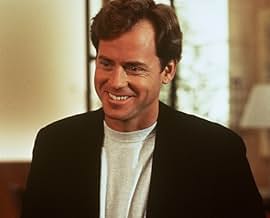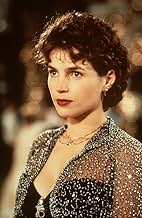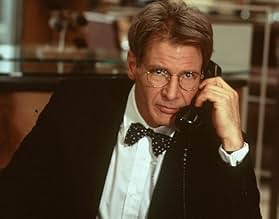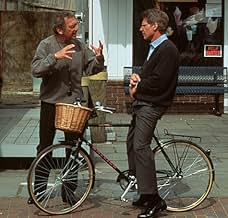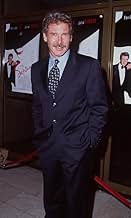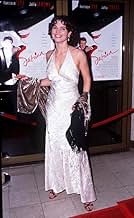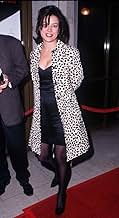IMDb-BEWERTUNG
6,3/10
46.205
IHRE BEWERTUNG
Ein hässliches Entlein, das einen bemerkenswerten Wandel vollzogen hat, empfindet immer noch etwas für ihren Schwarm, einen sorgenfrei lebenden Playboy, jedoch nicht, wenn es nach ihrem gesc... Alles lesenEin hässliches Entlein, das einen bemerkenswerten Wandel vollzogen hat, empfindet immer noch etwas für ihren Schwarm, einen sorgenfrei lebenden Playboy, jedoch nicht, wenn es nach ihrem geschäftstüchtigen Bruder geht.Ein hässliches Entlein, das einen bemerkenswerten Wandel vollzogen hat, empfindet immer noch etwas für ihren Schwarm, einen sorgenfrei lebenden Playboy, jedoch nicht, wenn es nach ihrem geschäftstüchtigen Bruder geht.
- Für 2 Oscars nominiert
- 2 Gewinne & 6 Nominierungen insgesamt
Empfohlene Bewertungen
Sabrina Fairchild (Julia Ormond) grew up as the mousy daughter of the chauffeur (John Wood) of the wealthy Larrabee family on the north shore of Long Island. It was a grand estate and she would spy on their grand parties from a tree. Maude Larrabee (Nancy Marchand) inherited the Larrabee Corporation from her dead husband. Cold-hearted Linus Larrabee (Harrison Ford) took the company to even greater heights. David (Greg Kinnear) is the playboy son who Sabrina is completely infatuated with. She goes off to Paris to work on Vogue as a lowly assistant. She slowly moves away from her David infatuation to a love affair with a photographer. Meanwhile David is falling for Elizabeth Tyson (Lauren Holly) whose family business Linus wants to merge with. Elizabeth wants to marry David but he is reluctant to let go of his playboy lifestyle. Sabrina comes home and David doesn't recognize her at first. David becomes infatuated threatening to derail the marriage plans and Linus' big business deal.
The movie is asking too much of Julia Ormond. She looks too old to play a teenager. She is also too young to play the love interest for Harrison Ford. Their chemistry is way too cold. That is the biggest missing element. Greg Kinnear actually has better chemistry. They could have worked together in a romance. Harrison Ford is not good in this role. In fact, I have difficulty pointing to any good romantic leading roles for him that actually worked without an action thriller. However, the movie has the solid foundations of the '54 film. That much is there. It has some great scenes. It seems to always work when Julia Ormond gets emotionally walloped. She's possibly the best part of the movie. Ford just doesn't have that extra gear to be the sensitive romantic lead when the movie calls for it.
The movie is asking too much of Julia Ormond. She looks too old to play a teenager. She is also too young to play the love interest for Harrison Ford. Their chemistry is way too cold. That is the biggest missing element. Greg Kinnear actually has better chemistry. They could have worked together in a romance. Harrison Ford is not good in this role. In fact, I have difficulty pointing to any good romantic leading roles for him that actually worked without an action thriller. However, the movie has the solid foundations of the '54 film. That much is there. It has some great scenes. It seems to always work when Julia Ormond gets emotionally walloped. She's possibly the best part of the movie. Ford just doesn't have that extra gear to be the sensitive romantic lead when the movie calls for it.
Many critiques on this site suppose that it is somehow superior to the original. I am not sure how this can hold up. While Harrison Ford and Greg Kinnear are fine actors in their own right, comparing them to the coupling of Bogart and Holden is ridiculous. Just because a movie is OLD does not make it better, but if it is impeccably filmed and acted superbly, what is the point in redoing it to inferior standards? I suggest that the state of movie-making has in fact declined, as the art form has given way to popular sentiment, over-the-top portrayals of characters, and remakes which attempt to market themselves on previous successful attempts. To say that someone who repainted a Michaelangelo has made it somewhat made it better because painting has "evolved" is equally as stupid as saying any remake improves. And while Audrey Hepburn is not the world's finest actress, she has a unique cinematic quality which cannot be imitated or reproduced, much like her co-stars in this film. Please Hollywood, stop reproducing classics simply because there is a drought of originality and screenplays. Try rereleasing these classics so the public can see movies as they were meant to be viewed.
The temptation to compare it with the 1954 version is not small. And it is a good thing because the film has the force to use its voice. Julia Ormond is realy Sabrina. And Harrison Ford is a revelation as Linus. But, for me, the authetic good points are Miriam Colon as lovely Rosa and Nancy Marchand as wise,fascinating Maude Larrabee. Short, a seductive film.
I was surprised at how good this movie is. A remake of a movie starring Audrey Hepburn, Humphrey Bogart and William Holden, directed by one of the greats of American cinema, Billy Wilder, is not exactly the kind of task for the faint of heart. The fact that Sydney Pollack (They Shoot Horses Don't They? (1969), Tootsie (1982), Out of Africa (1985), etc.) decided to do it must have raised a few eyebrows in Hollywood land.
And let's just say I had preconceptions as I sat down to watch this. No way could this be anything near as good as the original. And for the first twenty minutes or so I was not dissuaded. Julia Ormond, who was given Miss Hepburn's title role, seemed nothing far removed from ordinary; and Greg Kinnear, who played the playboy David Larrabee, seemed a poor imitation of William Holden. Of course Harrison Ford, I told myself, is another story, since he is the embodiment of the fulfillment of the desire of many woman, and a fine, accomplished leading man. He would be, I suspected, the lone bright spot. In the original, Humphrey Bogart, a little past his prime, and in not exactly the best of moods, and not entirely pleased with the relatively inexperienced Audrey Hepburn, played the cool tycoon Linus Larrabee with some distracted forbearance in what many consider one of his lesser performances. Surely Harrison Ford could improve on that.
He did, but what really surprised me was just how diabolically clever the oh, so romantic script by Barbara Benedek and David Rayfiel turned out to be. I mean, Cinderella move over. Sabrina could not have achieved a more glorious existence had she died and gone to heaven. It is hard to imagine a more fulfilling fantasy for a chauffeur's daughter than what transpires here.
Quickly here's the premise of this celluloid fairy tale/romance: Pretty but ordinary Sabrina, born of working class parents, her father the chauffeur of the ultra rich Larrabees, grows up living above the garage in the palatial Larrabee estate. She watches the lavish parties thrown by the Larrabees from a spot in a tree and falls madly in the kind of puppy love that never goes away with the younger of the Larrabee brothers, David, who is the kind of guy who gives playboys a bad name. When she comes of age, she goes away to Paris (apparently to work for a fashion magazine: in the original Sabrina, she goes to a cooking school in Paris), picks up confidence and a new kind of eye-popping sophistication, comes back and...well, gets noticed.
The basic skeleton of this, the story from the first Sabrina (1954), which is dreamily romantic enough and then some, is greatly augmented here with some very fine psychological touches including developing Sabrina's character beyond the pretty and stylish to something bordering on the wise and heroic. Suffice it to say that we come away feeling she deserves every rainbow's end she gets. I can see Benedek and Rayfiel exclaiming with riotous joy as they are writing the script (trading e-mails perhaps): "They want romance, they want woman's fantasy? They want Sabrina to have a pot of gold and true love everlasting? How about riches beyond counting and the doting attention of the two handsome, very rich brothers? She can take her pick. We've give 'em romance, we'll give 'em dreams come true!" And they do. Not only that, but they keep us guessing about who gets the girl until the last possible moment, and they do that very cleverly.
Of course it helps to have professional direction by Sydney Pollack and a fine cast including Harrison Ford--at his best, by the way--and Julia Ormond, a hard-working and talented actress (I recall her from Smilla's Sense of Snow, 1997), who knows how to be cute without fawning, supported by Greg Kinnear, Nancy Marchand, John Wood and Angie Dickinson. I mention Miss Dickinson because, as the mother of a perspective bride about to throw an incredibly lavish wedding, she gets to deliver this "let them eat cake" line: "We thought we'd use recycled paper" (for the wedding invitations).
The script is full of similar witticisms, some verbal, some like eye candy. For example, when Sabrina removes her glasses (the usual Hollywood signal for the adolescent ugly duckling to become a beautiful swan) after gaining sophistication in Paris, she quotes aptly but surprisingly from Gertrude Stein: "America is my country and Paris is my home." (Of course Gertrude Stein never heard of Paris, Texas--but that is another film, and besides, I digress...)
I also liked it when Sabrina is in the arms of her Paris would-be lover who kisses her, and--noticing that she is not as engaged as she might me–observes with perfect decorum, "I'm embarrassed that you're somewhere else."
Memorable was the shot of Harrison Ford momentarily looking jealous and hurt. By the way, he has a number of good lines, and he delivers them well.
I especially liked it when he sadly confessed: "I was sent to deal with you. I sent myself."
It is probably better if you haven't seen the original and can experience this on its own merits without the odiousness that sometimes comes with comparisons. Comparing Audrey Hepburn with Julia Ormond is like comparing Grace Kelly with Jennifer Lopez. They really are very different people. And comparing Billy Wilder's 1954 film (from the play by Samuel Taylor) is a little like comparing Lon Chaney's Phantom of the Opera with Andrew Lloyd Webber's.
Bottom line: see this for both Harrison Ford who wears the business-first character of the "only surviving heart donor" very well, and for Julia Ormond whose intense and beguiling performance makes us forgive her for not being Audrey Hepburn.
(Note: Over 500 of my movie reviews are now available in my book "Cut to the Chaise Lounge or I Can't Believe I Swallowed the Remote!" Get it at Amazon!)
And let's just say I had preconceptions as I sat down to watch this. No way could this be anything near as good as the original. And for the first twenty minutes or so I was not dissuaded. Julia Ormond, who was given Miss Hepburn's title role, seemed nothing far removed from ordinary; and Greg Kinnear, who played the playboy David Larrabee, seemed a poor imitation of William Holden. Of course Harrison Ford, I told myself, is another story, since he is the embodiment of the fulfillment of the desire of many woman, and a fine, accomplished leading man. He would be, I suspected, the lone bright spot. In the original, Humphrey Bogart, a little past his prime, and in not exactly the best of moods, and not entirely pleased with the relatively inexperienced Audrey Hepburn, played the cool tycoon Linus Larrabee with some distracted forbearance in what many consider one of his lesser performances. Surely Harrison Ford could improve on that.
He did, but what really surprised me was just how diabolically clever the oh, so romantic script by Barbara Benedek and David Rayfiel turned out to be. I mean, Cinderella move over. Sabrina could not have achieved a more glorious existence had she died and gone to heaven. It is hard to imagine a more fulfilling fantasy for a chauffeur's daughter than what transpires here.
Quickly here's the premise of this celluloid fairy tale/romance: Pretty but ordinary Sabrina, born of working class parents, her father the chauffeur of the ultra rich Larrabees, grows up living above the garage in the palatial Larrabee estate. She watches the lavish parties thrown by the Larrabees from a spot in a tree and falls madly in the kind of puppy love that never goes away with the younger of the Larrabee brothers, David, who is the kind of guy who gives playboys a bad name. When she comes of age, she goes away to Paris (apparently to work for a fashion magazine: in the original Sabrina, she goes to a cooking school in Paris), picks up confidence and a new kind of eye-popping sophistication, comes back and...well, gets noticed.
The basic skeleton of this, the story from the first Sabrina (1954), which is dreamily romantic enough and then some, is greatly augmented here with some very fine psychological touches including developing Sabrina's character beyond the pretty and stylish to something bordering on the wise and heroic. Suffice it to say that we come away feeling she deserves every rainbow's end she gets. I can see Benedek and Rayfiel exclaiming with riotous joy as they are writing the script (trading e-mails perhaps): "They want romance, they want woman's fantasy? They want Sabrina to have a pot of gold and true love everlasting? How about riches beyond counting and the doting attention of the two handsome, very rich brothers? She can take her pick. We've give 'em romance, we'll give 'em dreams come true!" And they do. Not only that, but they keep us guessing about who gets the girl until the last possible moment, and they do that very cleverly.
Of course it helps to have professional direction by Sydney Pollack and a fine cast including Harrison Ford--at his best, by the way--and Julia Ormond, a hard-working and talented actress (I recall her from Smilla's Sense of Snow, 1997), who knows how to be cute without fawning, supported by Greg Kinnear, Nancy Marchand, John Wood and Angie Dickinson. I mention Miss Dickinson because, as the mother of a perspective bride about to throw an incredibly lavish wedding, she gets to deliver this "let them eat cake" line: "We thought we'd use recycled paper" (for the wedding invitations).
The script is full of similar witticisms, some verbal, some like eye candy. For example, when Sabrina removes her glasses (the usual Hollywood signal for the adolescent ugly duckling to become a beautiful swan) after gaining sophistication in Paris, she quotes aptly but surprisingly from Gertrude Stein: "America is my country and Paris is my home." (Of course Gertrude Stein never heard of Paris, Texas--but that is another film, and besides, I digress...)
I also liked it when Sabrina is in the arms of her Paris would-be lover who kisses her, and--noticing that she is not as engaged as she might me–observes with perfect decorum, "I'm embarrassed that you're somewhere else."
Memorable was the shot of Harrison Ford momentarily looking jealous and hurt. By the way, he has a number of good lines, and he delivers them well.
I especially liked it when he sadly confessed: "I was sent to deal with you. I sent myself."
It is probably better if you haven't seen the original and can experience this on its own merits without the odiousness that sometimes comes with comparisons. Comparing Audrey Hepburn with Julia Ormond is like comparing Grace Kelly with Jennifer Lopez. They really are very different people. And comparing Billy Wilder's 1954 film (from the play by Samuel Taylor) is a little like comparing Lon Chaney's Phantom of the Opera with Andrew Lloyd Webber's.
Bottom line: see this for both Harrison Ford who wears the business-first character of the "only surviving heart donor" very well, and for Julia Ormond whose intense and beguiling performance makes us forgive her for not being Audrey Hepburn.
(Note: Over 500 of my movie reviews are now available in my book "Cut to the Chaise Lounge or I Can't Believe I Swallowed the Remote!" Get it at Amazon!)
I saw the original "Sabrina" before ever seeing the remake. I adored Audrey Hepburn in all of her movies, and this was not an exception. Her comedic timing was perfect. She was completely believable as a young ingenue, and of course, she would not be Audrey Hepburn if she weren't absolutely breakthtaking on screen. But while I enjoyed the original, I have seen it only once, whereas I have seen the remake so many times I have lost count!
The 1995 "Sabrina" is a gem of a film. I keep hearing myself describe it as funny, but sometimes I wonder if that's even the right word. That's because except for that rather unexpected burst of laughter from Linus' secretary, which cracks me up EVERY time I get to that part, I have never found myself laughing aloud while watching this movie. But the humor is so cleverly written, it is impossible to ignore just how charming and comical this movie is.
The script is wonderfully brought to life by the outstanding cast. Harrison Ford is superb as Linus Larrabee. He plays Linus as a serious and almost ruthless businessman, and yet gains our sympathy as he gradually shows a tender and vulnerable side to Linus' cool exterior. Greg Kinnear is well-cast as Linus' dish of a younger brother, David. True, David is self-centered, careless, and carefree. But Greg Kinnear plays him with utter charm that we understand why Sabrina and women in general are so taken with him. And what of Julia Ormond? Well, I think she was absolutely perfect as Sabrina. If she had felt any trepidation essaying the role that had been so closely identified with an icon like Audrey Hepburn, none of her nerves translated on to the screen. She IS Sabrina. I think it's a wonderful combination of her beauty and acting skills that helped her succeed in this role. The sincerity of her performance makes Sabrina so appealing and completely lovable.
The performances of the three leads are complemented by a fine supporting cast made up of John Wood, Nancy Marchand, Dana Ivey, Richard Crenna, and Angie Dickinson. Some of the film's funniest moments involve their characters. And then there is the exquisite soundtrack composed by John Williams. The score is at once dreamy and intoxicating. Two songs that were written for the movie, "(In the) Moonlight" and "How Can I Remember?", are just as memorable and perfectly capture the feelings of romance and longing.
Hollywood has made a number of successful romantic movies, and I think "Sabrina" ranks as one of its best. Its charm never wears off. It sweeps you off your feet and makes your heart soar. It is a marvelous, marvelous film!
The 1995 "Sabrina" is a gem of a film. I keep hearing myself describe it as funny, but sometimes I wonder if that's even the right word. That's because except for that rather unexpected burst of laughter from Linus' secretary, which cracks me up EVERY time I get to that part, I have never found myself laughing aloud while watching this movie. But the humor is so cleverly written, it is impossible to ignore just how charming and comical this movie is.
The script is wonderfully brought to life by the outstanding cast. Harrison Ford is superb as Linus Larrabee. He plays Linus as a serious and almost ruthless businessman, and yet gains our sympathy as he gradually shows a tender and vulnerable side to Linus' cool exterior. Greg Kinnear is well-cast as Linus' dish of a younger brother, David. True, David is self-centered, careless, and carefree. But Greg Kinnear plays him with utter charm that we understand why Sabrina and women in general are so taken with him. And what of Julia Ormond? Well, I think she was absolutely perfect as Sabrina. If she had felt any trepidation essaying the role that had been so closely identified with an icon like Audrey Hepburn, none of her nerves translated on to the screen. She IS Sabrina. I think it's a wonderful combination of her beauty and acting skills that helped her succeed in this role. The sincerity of her performance makes Sabrina so appealing and completely lovable.
The performances of the three leads are complemented by a fine supporting cast made up of John Wood, Nancy Marchand, Dana Ivey, Richard Crenna, and Angie Dickinson. Some of the film's funniest moments involve their characters. And then there is the exquisite soundtrack composed by John Williams. The score is at once dreamy and intoxicating. Two songs that were written for the movie, "(In the) Moonlight" and "How Can I Remember?", are just as memorable and perfectly capture the feelings of romance and longing.
Hollywood has made a number of successful romantic movies, and I think "Sabrina" ranks as one of its best. Its charm never wears off. It sweeps you off your feet and makes your heart soar. It is a marvelous, marvelous film!
Wusstest du schon
- WissenswertesSydney Pollack initially turned down the chance to direct the remake, thinking the material too dated to work effectively in 1995. Once he agreed to take it on, Pollack made sure he had the approval of the original's director, Billy Wilder.
- PatzerLinus leaves the first party early because he needs to check on the Tokyo markets before they close. But Tokyo financial markets would close at 4:00 AM or 5:00 AM New York time. It is clearly not that late in the evening.
- VerbindungenEdited into Sting: Moonlight (1995)
- SoundtracksMoonlight
Music by John Williams
Lyrics by Alan Bergman and Marilyn Bergman
Performed by Michael Dees
Produced by John Williams
Top-Auswahl
Melde dich zum Bewerten an und greife auf die Watchlist für personalisierte Empfehlungen zu.
Details
- Erscheinungsdatum
- Herkunftsländer
- Sprachen
- Auch bekannt als
- Сабріна
- Drehorte
- Salutation House, West Island, Glen Cove, Long Island, New York, USA(Larrabee mansion)
- Produktionsfirmen
- Weitere beteiligte Unternehmen bei IMDbPro anzeigen
Box Office
- Budget
- 58.000.000 $ (geschätzt)
- Bruttoertrag in den USA und Kanada
- 53.672.080 $
- Eröffnungswochenende in den USA und in Kanada
- 5.563.259 $
- 17. Dez. 1995
- Weltweiter Bruttoertrag
- 53.696.959 $
- Laufzeit2 Stunden 7 Minuten
- Farbe
- Sound-Mix
- Seitenverhältnis
- 1.85 : 1
Zu dieser Seite beitragen
Bearbeitung vorschlagen oder fehlenden Inhalt hinzufügen


